人教版(2019) 选择性必修第一册 Unit 4 Body Language How do I know my students公开课课件(30张ppt)
文档属性
| 名称 | 人教版(2019) 选择性必修第一册 Unit 4 Body Language How do I know my students公开课课件(30张ppt) |
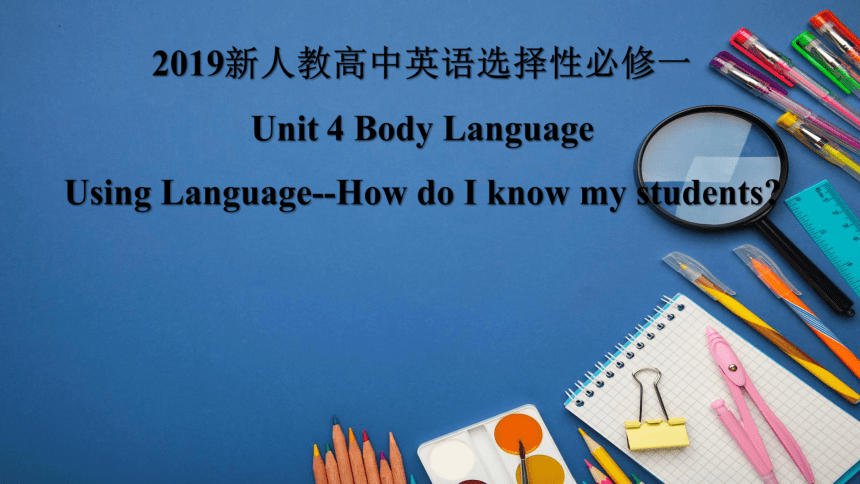
|
|
| 格式 | pptx | ||
| 文件大小 | 3.4MB | ||
| 资源类型 | 教案 | ||
| 版本资源 | 人教版(2019) | ||
| 科目 | 英语 | ||
| 更新时间 | 2022-10-21 00:00:00 | ||
图片预览

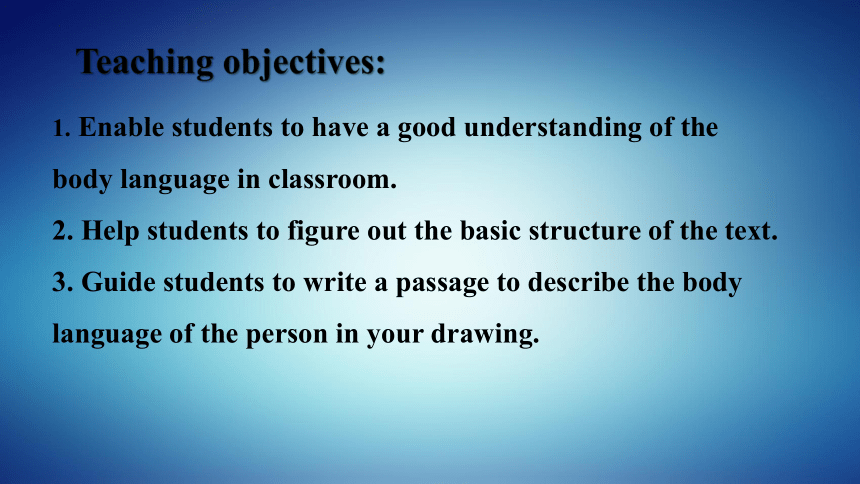
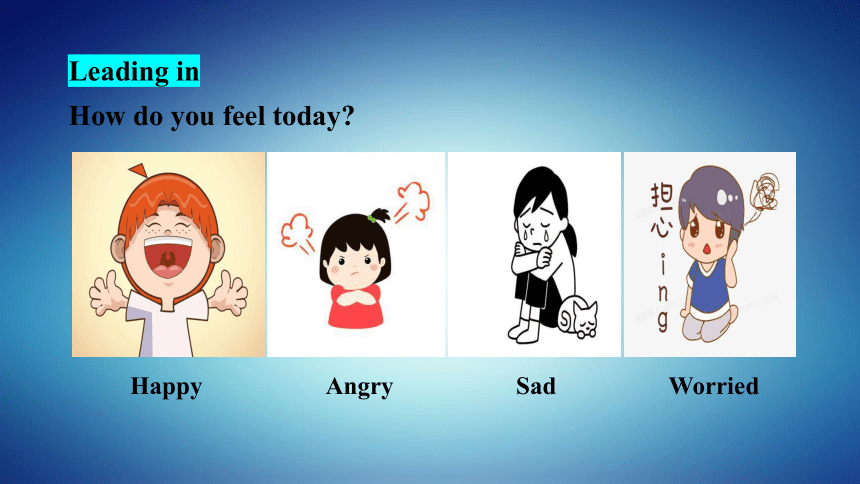
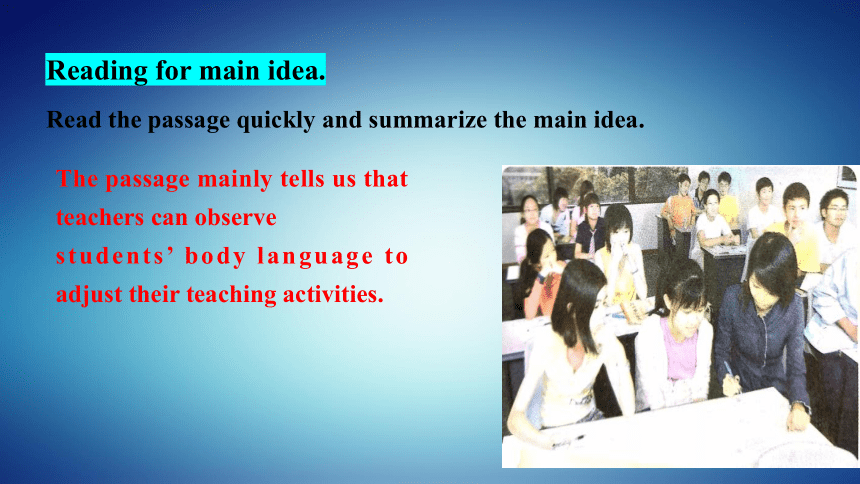
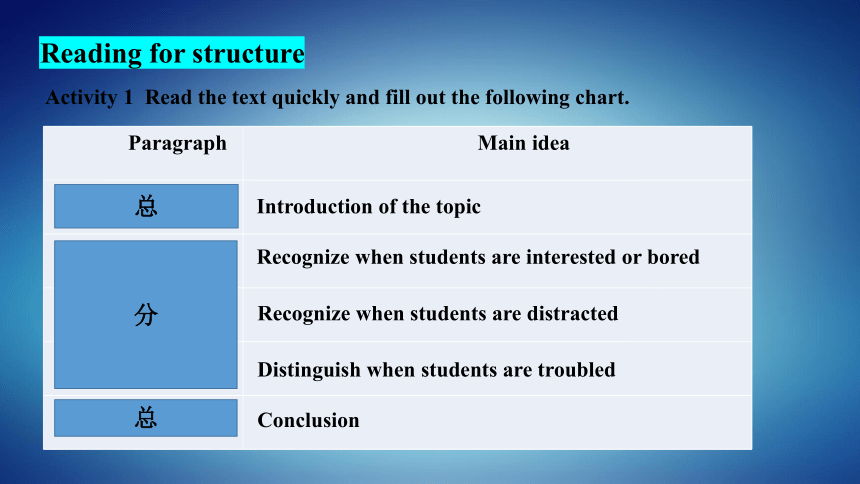
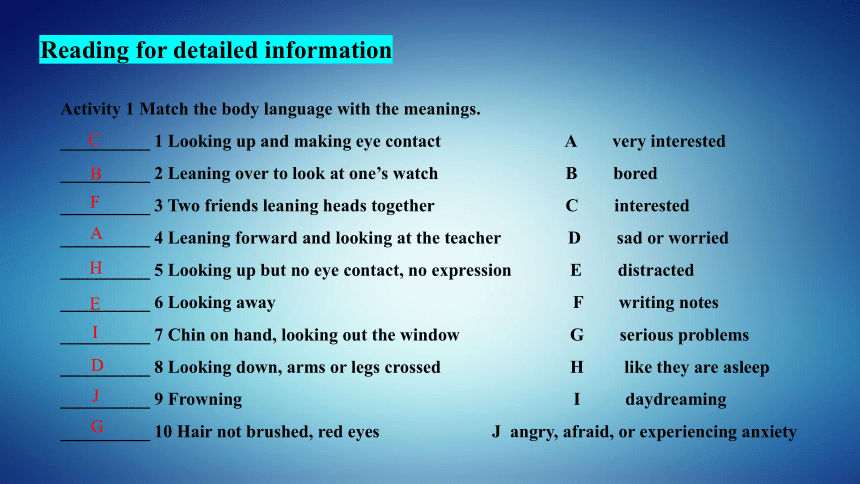
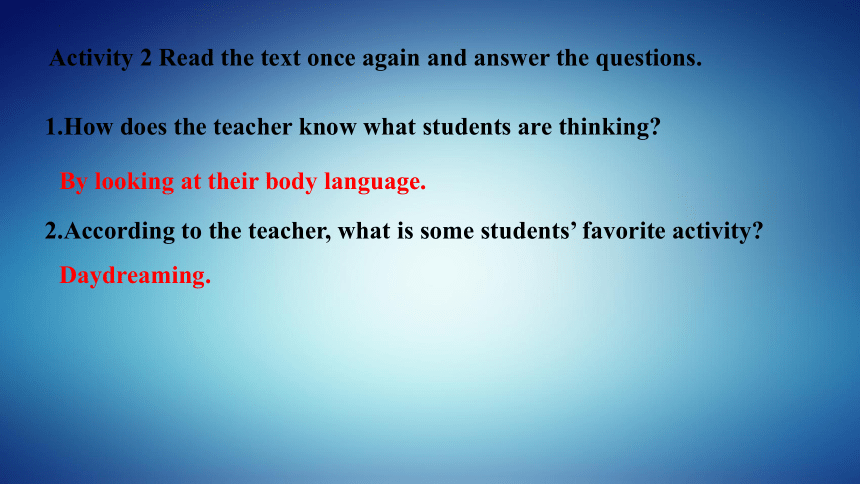
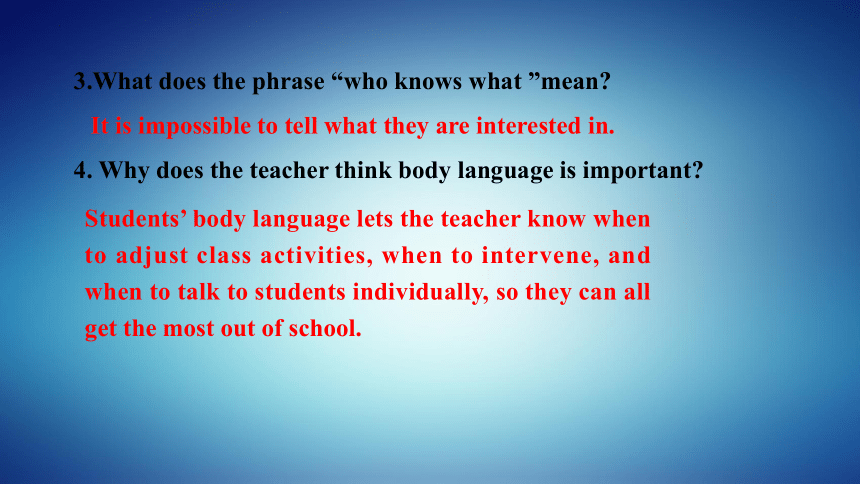
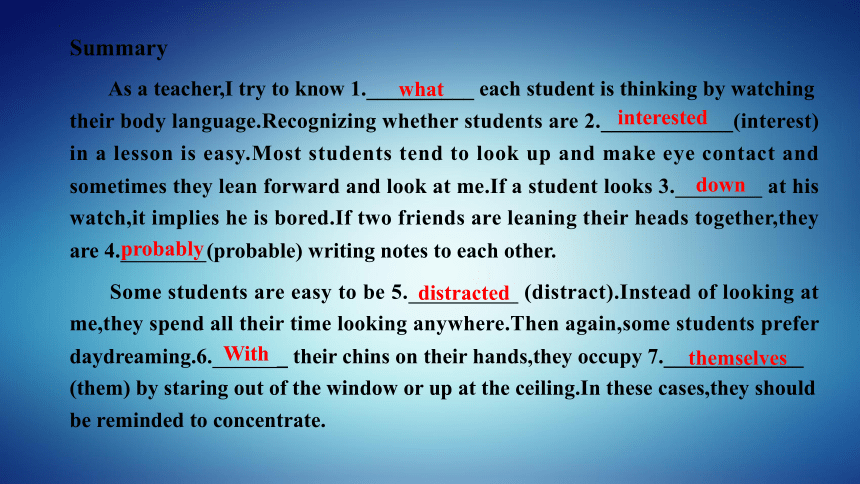
文档简介
(共29张PPT)
2019新人教高中英语选择性必修一
Unit 4 Body Language
Using Language--How do I know my students
Teaching objectives:
1. Enable students to have a good understanding of the body language in classroom.
2. Help students to figure out the basic structure of the text.
3. Guide students to write a passage to describe the body language of the person in your drawing.
Leading in
How do you feel today
Happy
Angry
Sad
Worried
Reading for main idea.
Read the passage quickly and summarize the main idea.
The passage mainly tells us that teachers can observe
students’ body language to adjust their teaching activities.
Reading for structure
Activity 1 Read the text quickly and fill out the following chart.
Paragraph Main idea
Paragraph 1 and 2
Paragraph 3
Paragraph 4
Paragraph 5
Paragraph 6
Introduction of the topic
Recognize when students are interested or bored
Recognize when students are distracted
Distinguish when students are troubled
Conclusion
总
分
总
Reading for detailed information
Activity 1 Match the body language with the meanings.
__________ 1 Looking up and making eye contact A very interested
__________ 2 Leaning over to look at one’s watch B bored
__________ 3 Two friends leaning heads together C interested
__________ 4 Leaning forward and looking at the teacher D sad or worried
__________ 5 Looking up but no eye contact, no expression E distracted
__________ 6 Looking away F writing notes
__________ 7 Chin on hand, looking out the window G serious problems
__________ 8 Looking down, arms or legs crossed H like they are asleep
__________ 9 Frowning I daydreaming
__________ 10 Hair not brushed, red eyes J angry, afraid, or experiencing anxiety
C
B
F
A
H
E
I
D
J
G
Activity 2 Read the text once again and answer the questions.
1.How does the teacher know what students are thinking
2.According to the teacher, what is some students’ favorite activity
Daydreaming.
By looking at their body language.
3.What does the phrase “who knows what ”mean
4. Why does the teacher think body language is important
Students’ body language lets the teacher know when to adjust class activities, when to intervene, and when to talk to students individually, so they can all get the most out of school.
It is impossible to tell what they are interested in.
Summary
As a teacher,I try to know 1.__________ each student is thinking by watching their body language.Recognizing whether students are 2.____________(interest) in a lesson is easy.Most students tend to look up and make eye contact and sometimes they lean forward and look at me.If a student looks 3. at his watch,it implies he is bored.If two friends are leaning their heads together,they are 4. (probable) writing notes to each other.
Some students are easy to be 5. (distract).Instead of looking at me,they spend all their time looking anywhere.Then again,some students prefer daydreaming.6. _ their chins on their hands,they occupy 7._____________ (them) by staring out of the window or up at the ceiling.In these cases,they should be reminded to concentrate.
what
interested
down
probably
distracted
With
themselves
Distinguishing when students are troubled is much 8.________ (hard).If students have their arms crossed in front of their chests and their legs 9. (close) or crossed,it shows they are angry,afraid,or experiencing anxiety.
Finally,it is my duty to help every student to learn and I adjust class 10. (activity) according to their body language.In my opinion,reacting to body language is an important component of being a teacher.
harder
closed
acivities
Practicing describing the body language in the photos.
In groups, discuss what these people are doing and what their body language is telling you.
3. The boy is telling a joke to the girl in secret, and she is hiding her face because she is laughing.
1. It looks like the teacher is pointing at a male student, who is looking up with a serious expression on his face. I think the teacher is scolding him for something. Meanwhile, the girl in the back of the photo is hiding her mouth with her hand, and from her eyes, it looks like she is smiling. Perhaps she is happy that the other student is being scolded.
2.The boy is giving a first pump and smiling. This is normally done when someone has just accomplished something good and wants to celebrate.
Writing
Activity 1 Draw someone you know. Show his body language in your drawing.
Activity 2 Write a passage to describe the body language of the person in your drawing.
One possible version:
This is my friend Tom. He is bending and drawing with a pencil in his hand. His other hand holds an eraser, because he wants to use it as soon as he needs it without wasting time. Tom is a very serious artist, which you can tell from the intense look on his face. When he is drawing, he tends to focus all his attention on it. It is often the case that when other people call out his name, he does not even hear them because he is lost in his art world.
Language points:
educator
tendency
lower
imply
barely
occupy
stare
ceiling
perceive
distinguish
anxiety
chest
embarrassed
ashamed
merely
bother
weep
conflict
inquire
ultimately
intervene
adjust
react
tone
(短暂地)访问;要求(某人讲话等);正式邀请
有某种影响;在工作
同时
开玩笑
注意
与……有冲突
对……做出反应
抢走某人的某物
1.occupy vt.占据;占用
【教材原句】With their chins on their hands,they occupy themselves by staring out of the window or up at the ceiling.他们双手托着下巴,眼睛盯着窗外或天花板。
【词汇精讲】occupy vt.占据;占用
An large gallery was to occupy the west wing of the house and be devoted to pictures.
一个巨大的画廊占据了房子的西翼,专门陈列画作。
The capital has been occupied by the rebel army.
叛军已占领了首都。
【词汇拓展】
The workers are occupied in building new houses.
建筑工正忙于建造新房子。
She keeps herself fully occupied with volunteer activities.
她自己不间断地、全身心地忙于志愿者活动。
2.distinguish vt.& vi.区分;辨别
【教材原句】While it is easy to perceive when students are interested,bored,or distracted,it is sometimes much harder to distinguish when students are troubled.尽管学生们何时(对讲课)感兴趣、何时感到无聊或精力不集中是很容易察觉的,但要发现学生何时有困扰有时会难得多。
【词汇精讲】distinguish vt.& vi.区分;辨别
These robots will be able to distinguish when someone is happy or sad.
这些机器人能够辨人什么时候高兴,什么时候伤心。
He can distinguish the sound of piano in an orchestra.
他能分辨出管弦乐队演奏时钢琴的声音。
The Chinese nation is distinguished for its diligence and courage.
中华民族以勤劳勇敢著称。
I sometimes have difficulty distinguishing Spanish from Portuguese.
我有时很难把西班牙人和葡萄牙人区分开来。
【词汇拓展】
3.call on(短暂地)访问;要求(某人讲话);正式邀请
【教材原句】Some students act this way merely because they are afraid of being called on by the teacher.有些学生这样做仅仅是因为他们害怕老师提问。
【词汇精讲】call on(短暂地)访问;要求(某人讲话);正式邀请
I called on my former English teacher last month.
上个月我拜访了我以前的英语老师。
Mary is shy and she is afraid of being called on in class.
玛丽害羞,害怕课上被提问。
4.bother vt.& vi.费心;麻烦;因……而操心 n.麻烦;不便
【教材原句】However,if a student does not bother to brush her hair and her eyes are red from weeping,then I can infer that there are deeper issues at work.但是,要是学生都懒得梳头,并且两眼因哭泣而发红,那么我能够推断她遇到了更严重的问题。
【词汇精讲】bother vt.& vi.费心;麻烦;因……而操心
n.麻烦;不便
So long as she had a slice to eat,she never bothered the one on her head.只要有一片吃着,她就不会费心理会头上的那一片。
I don’t want to give you any extra bother.我不想给你添额外的麻烦。
【词汇拓展】
He didn’t even bother to say thank you.
他甚至连说一声谢谢都不肯。
I’m sorry to bother you with so many questions on such an occasion.
在这种情况下,我还问了你这么多问题,给你添麻烦了。
5.adjust vt.调整;调节 vi.& vt.适应;(使)习惯
【教材原句】Their body language lets me know when to adjust class activities,when to intervene,and when to talk to students individually.他们的肢体语言让我知道什么时候调整课堂活动,什么时候干预,什么时候单独与学生交谈。
【词汇精讲】adjust vt.调整;调节 vi.& vt.适应;(使)习惯
I usually adjust my watch before I go to work in the morning.
我通常早上上班前校准我的表.
It would take me some time to adjust to the sudden change in temperature.要适应天气的这种突然变化还要花上一段时间。
【词汇拓展】
We have been preparing our fighters to adjust themselves to civil society.
我们一直在培训我们的战士,以使他们适应普通的社会生活。
She made a few minor adjustments to the focus of her camera.
她对相机的焦距做了一些小的调整。
While it is easy to perceive when students are interested,bored,or distracted,it is sometimes much harder to distinguish when students are troubled.尽管学生们何时(对讲课)感兴趣、何时感到无聊或精力不集中是很容易察觉的,但要发现学生何时有困扰有时会难得多。
【句式剖析】本句是一个复合句。it is sometimes much harder...是主句,while引导的是让步状语从句,两个when引导的是都是宾语从句。While引导让步状语从句时,相当于although或though,常用于句首。
While I admit his good points I can see his bad.
尽管我承认他的长处,但我也看到了他的不足。
While he loves his students,he is very strict with them.
虽然他爱他的学生,可是他对他们很严格.
Tip:
while引导时间状语从句时,从句中的谓语动词应用延续性动词或表示状态的词。While还可连接并列句,表示对比。While the discussion was still going on,George came in.
当讨论还在进行时,乔治走了进来。
I like playing football while my brother likes to play basketball. 我喜欢踢足球,而且我哥哥喜欢打篮球。
Practice
1. I Have been so occupied ______________work that I haven’t have time in social activities.
2.The new comers were occupied in______________(write) letters home.
3.Reading books can not only enrich our our minds but also to teach us to distinguish___________right and wrong.
4.As we all know she has already distinguished herself ___________ a great volleyable coach in the world.
5.They_______(号召)people and the government to take measures to fight .
6.You needn’t bother yourself____________such small things.
7. It took him quite a while to adjust to ___________(live) alone after his parents passed away.
8. We have made an______________ to our price and give you a special discount of 3 percent.
with
writing
between
as
call on
with
living
adjustment
2019新人教高中英语选择性必修一
Unit 4 Body Language
Using Language--How do I know my students
Teaching objectives:
1. Enable students to have a good understanding of the body language in classroom.
2. Help students to figure out the basic structure of the text.
3. Guide students to write a passage to describe the body language of the person in your drawing.
Leading in
How do you feel today
Happy
Angry
Sad
Worried
Reading for main idea.
Read the passage quickly and summarize the main idea.
The passage mainly tells us that teachers can observe
students’ body language to adjust their teaching activities.
Reading for structure
Activity 1 Read the text quickly and fill out the following chart.
Paragraph Main idea
Paragraph 1 and 2
Paragraph 3
Paragraph 4
Paragraph 5
Paragraph 6
Introduction of the topic
Recognize when students are interested or bored
Recognize when students are distracted
Distinguish when students are troubled
Conclusion
总
分
总
Reading for detailed information
Activity 1 Match the body language with the meanings.
__________ 1 Looking up and making eye contact A very interested
__________ 2 Leaning over to look at one’s watch B bored
__________ 3 Two friends leaning heads together C interested
__________ 4 Leaning forward and looking at the teacher D sad or worried
__________ 5 Looking up but no eye contact, no expression E distracted
__________ 6 Looking away F writing notes
__________ 7 Chin on hand, looking out the window G serious problems
__________ 8 Looking down, arms or legs crossed H like they are asleep
__________ 9 Frowning I daydreaming
__________ 10 Hair not brushed, red eyes J angry, afraid, or experiencing anxiety
C
B
F
A
H
E
I
D
J
G
Activity 2 Read the text once again and answer the questions.
1.How does the teacher know what students are thinking
2.According to the teacher, what is some students’ favorite activity
Daydreaming.
By looking at their body language.
3.What does the phrase “who knows what ”mean
4. Why does the teacher think body language is important
Students’ body language lets the teacher know when to adjust class activities, when to intervene, and when to talk to students individually, so they can all get the most out of school.
It is impossible to tell what they are interested in.
Summary
As a teacher,I try to know 1.__________ each student is thinking by watching their body language.Recognizing whether students are 2.____________(interest) in a lesson is easy.Most students tend to look up and make eye contact and sometimes they lean forward and look at me.If a student looks 3. at his watch,it implies he is bored.If two friends are leaning their heads together,they are 4. (probable) writing notes to each other.
Some students are easy to be 5. (distract).Instead of looking at me,they spend all their time looking anywhere.Then again,some students prefer daydreaming.6. _ their chins on their hands,they occupy 7._____________ (them) by staring out of the window or up at the ceiling.In these cases,they should be reminded to concentrate.
what
interested
down
probably
distracted
With
themselves
Distinguishing when students are troubled is much 8.________ (hard).If students have their arms crossed in front of their chests and their legs 9. (close) or crossed,it shows they are angry,afraid,or experiencing anxiety.
Finally,it is my duty to help every student to learn and I adjust class 10. (activity) according to their body language.In my opinion,reacting to body language is an important component of being a teacher.
harder
closed
acivities
Practicing describing the body language in the photos.
In groups, discuss what these people are doing and what their body language is telling you.
3. The boy is telling a joke to the girl in secret, and she is hiding her face because she is laughing.
1. It looks like the teacher is pointing at a male student, who is looking up with a serious expression on his face. I think the teacher is scolding him for something. Meanwhile, the girl in the back of the photo is hiding her mouth with her hand, and from her eyes, it looks like she is smiling. Perhaps she is happy that the other student is being scolded.
2.The boy is giving a first pump and smiling. This is normally done when someone has just accomplished something good and wants to celebrate.
Writing
Activity 1 Draw someone you know. Show his body language in your drawing.
Activity 2 Write a passage to describe the body language of the person in your drawing.
One possible version:
This is my friend Tom. He is bending and drawing with a pencil in his hand. His other hand holds an eraser, because he wants to use it as soon as he needs it without wasting time. Tom is a very serious artist, which you can tell from the intense look on his face. When he is drawing, he tends to focus all his attention on it. It is often the case that when other people call out his name, he does not even hear them because he is lost in his art world.
Language points:
educator
tendency
lower
imply
barely
occupy
stare
ceiling
perceive
distinguish
anxiety
chest
embarrassed
ashamed
merely
bother
weep
conflict
inquire
ultimately
intervene
adjust
react
tone
(短暂地)访问;要求(某人讲话等);正式邀请
有某种影响;在工作
同时
开玩笑
注意
与……有冲突
对……做出反应
抢走某人的某物
1.occupy vt.占据;占用
【教材原句】With their chins on their hands,they occupy themselves by staring out of the window or up at the ceiling.他们双手托着下巴,眼睛盯着窗外或天花板。
【词汇精讲】occupy vt.占据;占用
An large gallery was to occupy the west wing of the house and be devoted to pictures.
一个巨大的画廊占据了房子的西翼,专门陈列画作。
The capital has been occupied by the rebel army.
叛军已占领了首都。
【词汇拓展】
The workers are occupied in building new houses.
建筑工正忙于建造新房子。
She keeps herself fully occupied with volunteer activities.
她自己不间断地、全身心地忙于志愿者活动。
2.distinguish vt.& vi.区分;辨别
【教材原句】While it is easy to perceive when students are interested,bored,or distracted,it is sometimes much harder to distinguish when students are troubled.尽管学生们何时(对讲课)感兴趣、何时感到无聊或精力不集中是很容易察觉的,但要发现学生何时有困扰有时会难得多。
【词汇精讲】distinguish vt.& vi.区分;辨别
These robots will be able to distinguish when someone is happy or sad.
这些机器人能够辨人什么时候高兴,什么时候伤心。
He can distinguish the sound of piano in an orchestra.
他能分辨出管弦乐队演奏时钢琴的声音。
The Chinese nation is distinguished for its diligence and courage.
中华民族以勤劳勇敢著称。
I sometimes have difficulty distinguishing Spanish from Portuguese.
我有时很难把西班牙人和葡萄牙人区分开来。
【词汇拓展】
3.call on(短暂地)访问;要求(某人讲话);正式邀请
【教材原句】Some students act this way merely because they are afraid of being called on by the teacher.有些学生这样做仅仅是因为他们害怕老师提问。
【词汇精讲】call on(短暂地)访问;要求(某人讲话);正式邀请
I called on my former English teacher last month.
上个月我拜访了我以前的英语老师。
Mary is shy and she is afraid of being called on in class.
玛丽害羞,害怕课上被提问。
4.bother vt.& vi.费心;麻烦;因……而操心 n.麻烦;不便
【教材原句】However,if a student does not bother to brush her hair and her eyes are red from weeping,then I can infer that there are deeper issues at work.但是,要是学生都懒得梳头,并且两眼因哭泣而发红,那么我能够推断她遇到了更严重的问题。
【词汇精讲】bother vt.& vi.费心;麻烦;因……而操心
n.麻烦;不便
So long as she had a slice to eat,she never bothered the one on her head.只要有一片吃着,她就不会费心理会头上的那一片。
I don’t want to give you any extra bother.我不想给你添额外的麻烦。
【词汇拓展】
He didn’t even bother to say thank you.
他甚至连说一声谢谢都不肯。
I’m sorry to bother you with so many questions on such an occasion.
在这种情况下,我还问了你这么多问题,给你添麻烦了。
5.adjust vt.调整;调节 vi.& vt.适应;(使)习惯
【教材原句】Their body language lets me know when to adjust class activities,when to intervene,and when to talk to students individually.他们的肢体语言让我知道什么时候调整课堂活动,什么时候干预,什么时候单独与学生交谈。
【词汇精讲】adjust vt.调整;调节 vi.& vt.适应;(使)习惯
I usually adjust my watch before I go to work in the morning.
我通常早上上班前校准我的表.
It would take me some time to adjust to the sudden change in temperature.要适应天气的这种突然变化还要花上一段时间。
【词汇拓展】
We have been preparing our fighters to adjust themselves to civil society.
我们一直在培训我们的战士,以使他们适应普通的社会生活。
She made a few minor adjustments to the focus of her camera.
她对相机的焦距做了一些小的调整。
While it is easy to perceive when students are interested,bored,or distracted,it is sometimes much harder to distinguish when students are troubled.尽管学生们何时(对讲课)感兴趣、何时感到无聊或精力不集中是很容易察觉的,但要发现学生何时有困扰有时会难得多。
【句式剖析】本句是一个复合句。it is sometimes much harder...是主句,while引导的是让步状语从句,两个when引导的是都是宾语从句。While引导让步状语从句时,相当于although或though,常用于句首。
While I admit his good points I can see his bad.
尽管我承认他的长处,但我也看到了他的不足。
While he loves his students,he is very strict with them.
虽然他爱他的学生,可是他对他们很严格.
Tip:
while引导时间状语从句时,从句中的谓语动词应用延续性动词或表示状态的词。While还可连接并列句,表示对比。While the discussion was still going on,George came in.
当讨论还在进行时,乔治走了进来。
I like playing football while my brother likes to play basketball. 我喜欢踢足球,而且我哥哥喜欢打篮球。
Practice
1. I Have been so occupied ______________work that I haven’t have time in social activities.
2.The new comers were occupied in______________(write) letters home.
3.Reading books can not only enrich our our minds but also to teach us to distinguish___________right and wrong.
4.As we all know she has already distinguished herself ___________ a great volleyable coach in the world.
5.They_______(号召)people and the government to take measures to fight .
6.You needn’t bother yourself____________such small things.
7. It took him quite a while to adjust to ___________(live) alone after his parents passed away.
8. We have made an______________ to our price and give you a special discount of 3 percent.
with
writing
between
as
call on
with
living
adjustment
